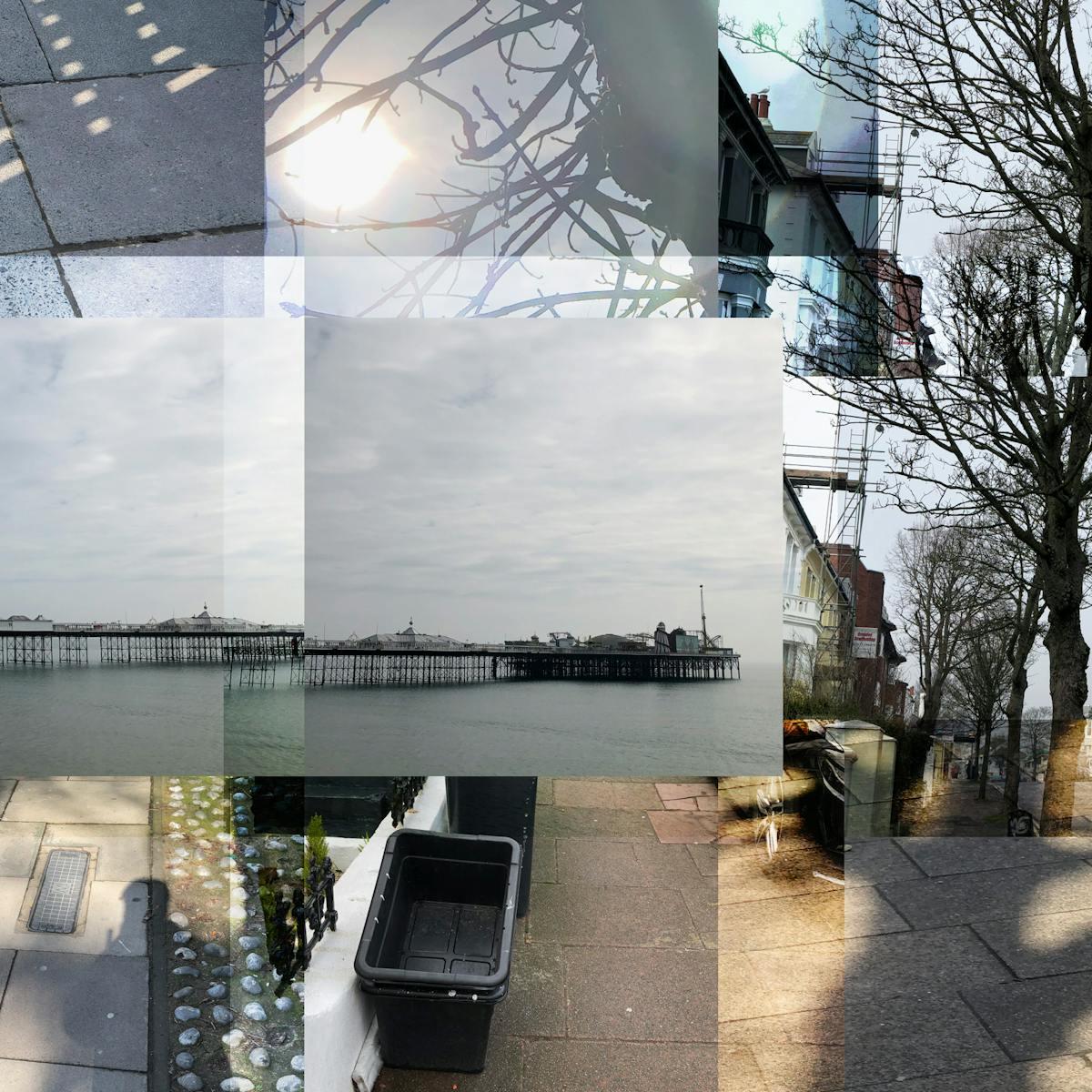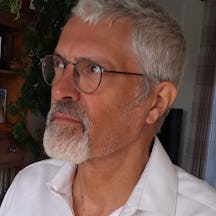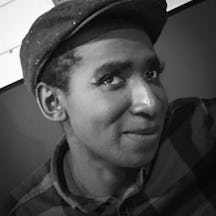In 2016 something happened to Steve Barker that not only changed the way he understood the world, but also challenged who he was. Over the course of just six weeks, he became deaf in his left ear and lost useful vision in his left eye. His sense of self was disrupted and then disappeared.
I first saw the UFOs while driving home in the dark – little bright lights twinkling at the edge of my vision. It brought a perverse sense of excitement, not at the prospect of welcoming aliens, but that something out of the ordinary was happening. After a busy career as a nurse, and as an academic researching neurology, my recent retirement to the countryside had been difficult.
My wife soon confirmed what I had intrinsically known: that this supernatural disturbance to my world came from within. Despite the sudden onset of symptoms, I went to bed with a cavalier “let’s see what tomorrow brings” frame of mind.
I awoke to a sunny dawn in my right eye but grey skies in my left. Clearly this was serious. And it wasn’t going away. Later that morning the GP sent me straight to the local hospital. The diagnosis? A detached and torn retina.
“You’ll need laser treatment,” said the consultant. “When?” I asked. “Now,” was the reply, as he rolled up his sleeves. There was no time to think – which was a blessing, because shining very bright lights into an eye is intrusive. And painful.
A surgical intervention
Unfortunately, the tear extended, so my wife drove me to the Edinburgh Eye Hospital for surgery. I was becoming a patient, with all the uncertainty and dependence that entails. In my 30 years as a nurse I had never been seriously ill. This new experience brought home the fact that we all grow old.
A vitrectomy and gas-bubble tamponade were performed. On discharge I was told to lie on my side for two weeks. This was a shock, but the reality was boredom.
‘Walk one, to the doctor’s surgery’. Photographed, written and voiced by Mickel Smithen aka Ebony Rose Dark.
Surgery for detached retinas has a 90 per cent success rate, although the visual outcome is unpredictable. There is a high risk of cataract formation, caused by the mechanical damage of surgery or the irritating presence of the gas, which is what happened to me.
The cataract in my eye was successfully removed, but it had masked permanent damage. I’d lost vision in the outer quarter and the rest was blurred. In low light I had no sight whatsoever, while bright sunshine or artificial light caused acute photophobia.
I was now, for all practical purposes, one-eyed.
First sight, then sound
Six weeks after the retinal detachment, I suddenly lost the majority of hearing in my left ear. I experienced 40 minutes of brilliant, bright, chaotic and colourful sound, then silence, later followed by a continual hissing.
An ENT consultant confirmed that I’d experienced sudden sensorineural hearing loss (SSHL). I’d also developed tinnitus. The devil’s chorus, as I call it, was worse at night because silence puts the brain on high alert. Any sound is perceived as a possible threat and given significance. This is called “auditory gain”, and it’s most noticeable when the body’s other senses are at rest.
I had lost the sense of my own body, shocked at how clumsy I had become.
‘Walk two, to the high street’. Photographed, written and voiced by Mickel Smithen aka Ebony Rose Dark.
We have five main senses: sight, hearing, taste, smell and touch. They all depend on sensitivity to light or heat, plus chemical or mechanical stimulation. Somatic sensations are felt in the body, on the skin, in the muscles and bones. Visceral sensations involve an awareness of our internal organs. We take our senses for granted – until they stop working.
Sight and sound are closely related, each confirming and reinforcing each other, cemented by touch. This dialogue is spontaneous and unconscious. Most sensory interruptions are minor and temporary. We can be ‘blinded’ by lights or ‘deafened’ by music. Sensations diminish with age, but we adapt. But sudden severe loss can change the individual’s relationship with the world.
For me, there was now disorder, disruption and disagreement between what I was seeing, hearing and feeling. I was unable to interpret and confirm sounds by accurate visual clues, or to easily judge the movement of objects without their accompanying sounds.
I had lost the sense of my own body, shocked at how clumsy I had become. Nor could I predict what others would do. I would experience a disturbing sense of ‘no sense’ as people vanished from my reduced field of sound and vision. Likewise, objects would also intrude or disappear. It seemed I could not conceive of their existence – until I tripped over them.
Yet I was now more aware than I had ever been. Every hazy sight and every distorted sound needed to be identified before it could be discounted as being of no threat or consequence. The result was exhaustion.
I spent those early anxious days constantly searching for what could no longer be found. My unconscious, spontaneous relationship with the world was broken.
‘Walk three, a local walk’. Photographed, written and voiced by Mickel Smithen aka Ebony Rose Dark.
Out of chaos comes order
At first I felt out of control, in a state of passive hyper-vigilance. This was gradually replaced by a period of disorganised hyperactivity.
I began compulsively researching what was happening to me. I took long walks. Woodwork helped me focus, and there were moments of mindfulness as I worked, lost to the task at hand. There has been no restoration – what was lost has gone – but these activities laid the foundations of my reformation.
I understood the biology behind my loss of sight and hearing, and I was aware I had probably helped to cause it. On the day my vision started to deteriorate, I had been lifting heavy rubble bags – physical exertion has been linked to retinal detachment. In the minutes before my sudden hearing loss I had used the Valsalva breath to clear my nose. There is no written evidence connecting this breathing technique with SSHL, but I think it is an interesting coincidence.
‘Walk four, to the seafront’ by Mickel Smithen aka Ebony Rose Dark.
I felt no self-recrimination. In terms of treatment, I knew there was nothing to be done. My experience as a nurse and knowledge of neurology gave me insight and a detachment that perhaps stopped me becoming depressed.
My losses were sudden, their impact permanent and profound. But my experience of living with and managing these changes has meant I'm now more in tune with my body and a little more emotionally resilient to what the future may hold. In short, I am more aware of myself and of the world I am in.
The physical loss remains real. I will always see less, hear less and be constantly distracted by tinnitus. I have to plan my life, base my future hopes and happiness with a real, objective awareness of these changes in mind. Not to do so would bring false hopes followed by despair.
So here I am. I have lost and I have gained. I never once considered myself ill: bits of me had just broken. Now I can try and answer that question, “What am I still good for?”
About the contributors
Steve Barker
Steve Barker is a retired nurse and research academic in neurology. In 2016, within six weeks, he lost the sight in his left eye and hearing in his left ear. It seriously challenged his sensory relationship with the world and challenged his idea of who he could be within it. Leaving behind previous interests in music and marquetry, he is now developing his skills in creative writing.
Mickel Smithen aka Ebony Rose Dark
Mickel, also known by his alter ego Ebony Rose Dark, is a visually impaired photographer and cabaret performance artist working with the Candoco Dance Company. Mickel studied performing arts at the Royal National College for the Blind, Hereford before moving on to study dance at Winchester University. Mickel’s photographs were published in the 2016 book ‘The Blind Photographer’ by Redstone Press, before being featured in a short film by the Economist in the same year. Mickel’s photography has been exhibited both in the UK and in France.


